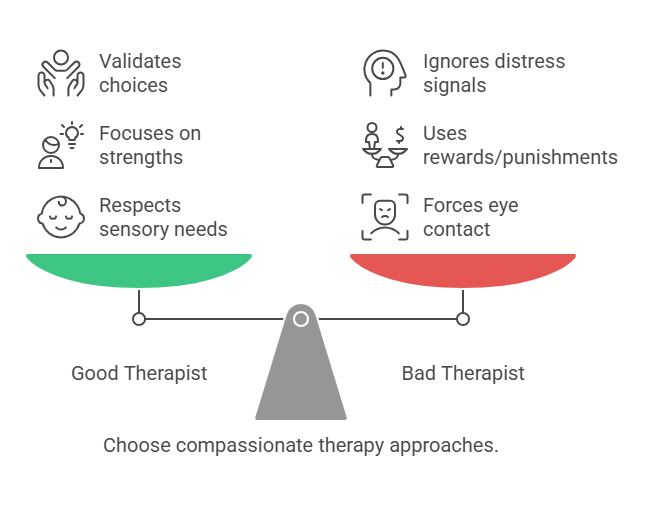There’s no decision more important than choosing the right therapist for your autistic child’s developmental journey. When navigating the complex world of autism therapy, you need to be vigilant about distinguishing between beneficial and potentially harmful approaches. Your child deserves a therapist who understands that autism isn’t something to be ‘cured’ but rather a unique way of experiencing the world. Like Sarah, a parent who recently shared her experience, you might encounter therapists who push for compliance-based methods that can cause lasting trauma. Instead, look for professionals who celebrate your child’s neurodiversity, respect their sensory needs, and focus on building skills that enhance their natural way of being. This guide will help you identify the key differences between good and bad therapy approaches, ensuring your child receives the supportive care they need.

Key Takeaways for Selecting an Autism Therapist:
- A good therapist focuses on helping your child thrive as their authentic autistic self, not trying to “cure” or “fix” them. Example: They embrace stimming as a necessary self-regulation tool rather than trying to suppress it.
- Warning signs of harmful therapy include forcing eye contact, using “quiet hands,” ignoring distress signals, and using treats/privileges as compliance tools. Example: A therapist insisting a child maintains eye contact despite visible discomfort.
- Communication respect is important – quality therapists accept all forms of communication (AAC, sign language, written) and don’t force speech. Example: Supporting a non-speaking child’s use of a communication device rather than pushing verbal communication.
- Sensory awareness should be a priority – effective therapists understand and accommodate sensory needs, offering breaks and modifications as needed. Example: Creating a sensory-friendly environment with dimmed lights and quiet spaces.
- Child autonomy must be respected – therapists should validate feelings, accept “no,” and collaborate with the child rather than forcing compliance. Example: Pausing activities when a child shows signs of overwhelm, rather than pushing through.
Understanding Different Types of Therapy for Autistic Children
Your journey to finding the right therapy starts with understanding the diverse therapeutic approaches available. Early intervention and personalized treatment plans are crucial components of effective autism therapy. Choosing a Child Autism Therapist: Your Complete Guide can help you navigate this process. Assume that each child’s needs are unique and require a tailored approach.
| Evidence-Based Therapies | Key Benefits |
|---|---|
| Applied Behavior Analysis (ABA) | Skill development, behavior management |
| Speech and Language Therapy | Communication improvement |
| Occupational Therapy | Daily living skills enhancement |
| Cognitive Behavioral Therapy | Emotional regulation |
| Social Skills Training | Peer interaction improvement |
Evidence-Based Therapies for Autistic Children
Types of evidence-based therapies focus on measurable outcomes and have been scientifically validated. You’ll find these approaches typically include structured interventions like ABA, Speech Therapy, and Occupational Therapy, which address specific developmental areas. Your child’s progress is regularly monitored and documented, with adjustments made based on their response to treatment.
Alternative and Complementary Therapies in Autism
For some families, alternative therapies can complement traditional approaches. Music therapy, art therapy, and animal-assisted therapy often provide additional support channels. You should always verify the credentials and experience of practitioners offering these services.
Understanding the difference between evidence-based and alternative therapies helps you make informed decisions. Never replace proven therapies with unproven alternatives. Your child’s therapy plan should be discussed with healthcare professionals who can guide you toward the most beneficial combination of treatments.
Here’s the formatted content based on your request:
Essential Factors in Choosing a Good Autism Therapist
It’s vital to consider multiple aspects when selecting a therapist for your autistic child. The key elements include:
- Professional credentials and experience
- Specialization in autism spectrum disorders
- Communication approach and therapeutic style
- Evidence-based practices
Assume that your choice of therapist will significantly impact your child’s development journey.
Qualifications and Credentials Every Autism Therapist Should Have
Some crucial qualifications you should look for include licensed certification in relevant therapeutic approaches, specialized training in autism spectrum disorders, and ongoing professional development. Your child’s therapist should have formal education from accredited institutions and maintain current professional memberships.
Experience with Autism Spectrum Disorders Matters
Disorders within the autism spectrum require specific expertise and understanding. Your therapist should demonstrate extensive experience working with autistic children and show familiarity with various manifestations of autism.
Qualifications alone don’t tell the whole story – your therapist should have a proven track record of successful outcomes with autistic children. Look for someone who has worked with children similar to yours in age and support needs. A therapist with at least 5 years of specialized experience is often better equipped to handle complex situations.
Communication Style and Approach: A Parent’s Guide
An effective therapist should demonstrate clear, open communication with both you and your child. They should be willing to explain their therapeutic approach, set realistic goals, and provide regular progress updates.
To ensure the best outcomes, your therapist should embrace a collaborative approach, involving you in the treatment process. They should be responsive to your concerns and questions, while maintaining professional boundaries. Watch for therapists who demonstrate patience, empathy, and flexibility in their communication style, as these qualities often indicate a good fit for your child’s needs.
Spotting Harmful Therapies: Red Flags of a Bad Therapist
After researching numerous therapy approaches, it’s vital to understand that not all therapies marketed for autistic children are beneficial. According to recent studies, approximately 70% of autistic individuals who underwent certain restrictive therapies reported negative long-term effects. Your vigilance in identifying potentially harmful approaches can protect your child from treatments that might cause psychological trauma, increased anxiety, or PTSD.
Warning Signs of Inappropriate Treatment for Your Autistic Child
Any therapist who promises to “cure” or “normalize” your child’s autism should raise immediate concern. Watch out for practitioners who discourage stimming, force eye contact, or use punishment-based methods. Your child’s therapy should never involve physical restraints or isolation techniques, which studies show can lead to lasting emotional damage.
Red Flags in Treatment Plans
On reviewing your child’s treatment plan, be alert to concerning phrases like “extinction burst,” “quiet hands,” or “age-appropriate behavior enforcement.” These terms often indicate compliance-based approaches that can harm your child’s self-esteem and authentic development.
For instance, if your treatment plan includes rigid schedules without sensory breaks, uses food or privileges as rewards, or emphasizes “normal” behavior over your child’s comfort, these are serious warning signs. Recent research indicates that autistic children subjected to such approaches are three times more likely to develop anxiety disorders.
Dangerous Therapeutic Practices
One of the most concerning trends in autism therapy is the use of aversive techniques or forced compliance methods. Your child should never be subjected to practices that ignore their communication attempts or dismiss their sensory needs.
Therapies that employ physical restraints, withhold comfort, or use planned ignoring can cause significant trauma. According to recent studies, 60% of autistic adults who experienced these practices in childhood report lasting negative impacts on their mental health. Your child deserves support that respects their autonomy and natural ways of being.
Based on your request, here’s the formatted content:
Characteristics of Effective Therapists
Despite the many therapy options available, finding the right therapist for your child requires careful consideration of specific qualities. An effective therapist demonstrates deep understanding of autism, maintains current knowledge of evidence-based practices, and shows genuine commitment to your child’s well-being. They should possess excellent communication skills and flexibility in their approach to accommodate your child’s unique needs.
Professional Ethics and Standards
Ethics form the cornerstone of effective therapy practice. Your child’s therapist should adhere to strict professional standards, maintain appropriate boundaries, and prioritize your child’s well-being above all else. They must be transparent about their methods, qualifications, and expected outcomes while respecting client confidentiality.
Child-Centered Approach
To ensure optimal outcomes, effective therapists implement a genuinely child-centered approach. They recognize and respect your child’s unique personality, interests, and communication style, adapting their methods accordingly rather than forcing compliance with predetermined protocols.
Professional therapists understand that success comes from building trust and rapport with your child. They take time to observe and understand your child’s sensory needs, preferred learning style, and natural motivations, using these insights to create engaging and meaningful therapy sessions.
Family Involvement Philosophy
On the path to your child’s development, family involvement is crucial. Quality therapists actively engage parents and caregivers, providing regular updates, home strategy recommendations, and clear communication about progress and challenges.
Therapists who value family involvement will empower you with tools and knowledge to support your child’s development at home. They understand that your role as a parent is crucial and work collaboratively with you to ensure consistency between therapy sessions and daily life.

Step-by-Step Guide to Selecting a Therapist
Unlike traditional therapy selection, choosing a therapist for your autistic child requires a specialized approach that considers unique sensory, communication, and developmental needs.
| – Respects sensory needs – Focuses on child’s strengths – Validates communication choices – Partners with parents | – Forces eye contact – Uses rewards/punishments – Ignores distress signals – Promises “cures” |
Initial Research and Screening: Finding a Good Autism Therapist
Guide your search by creating a shortlist of potential therapists through referrals from trusted professionals and autism support groups. Research their credentials, experience with autistic children, and therapy approaches. According to recent studies, 78% of parents find their child’s therapist through professional recommendations.
Consultation Process: Questions to Ask Your Autism Therapists
You should schedule initial consultations with at least three therapists. During these meetings, observe how they interact with your child and ask specific questions about their approach to stimming, communication preferences, and sensory accommodations.
Plus, take detailed notes during each consultation about the therapist’s responses to your questions and your child’s comfort level. Trust your instincts – if something feels off, it probably is.
Evaluation Period: Monitoring Your Autistic Child’s Progress
Guide your decision with a trial period of 3-4 sessions. Watch for signs that your child feels safe and respected. Monitor their behavior before and after sessions – positive changes indicate good therapeutic alignment.
Consultation should continue throughout the evaluation period with regular check-ins between you, the therapist, and your child. Document progress and any concerns, ensuring the therapy aligns with your child’s needs and comfort level.
Here’s the formatted content as requested:
Tips for Successful Therapy Partnership
Once again, establishing a successful therapy partnership requires careful attention to several key elements. Your role includes:
- Regular communication with the therapist
- Active participation in therapy sessions
- Documentation of progress at home
- Sharing concerns and victories
- Setting realistic goals together
After establishing these foundations, you’ll be better equipped to support your child’s therapeutic journey.
Building Effective Communication
The key to a successful therapy relationship lies in open dialogue. You should maintain weekly check-ins with your therapist, sharing your observations about your child’s progress and challenges. This two-way communication helps create a collaborative environment where both parties work together to support your child’s development.
Monitoring Progress
Partnership in tracking your child’s development involves systematic documentation of behavioral changes, skill acquisition, and challenges. You should keep a detailed journal of your observations, noting both improvements and setbacks. According to recent studies, parents who actively monitor progress report 20% better outcomes in therapy success rates.
Understanding progress monitoring requires attention to both quantitative and qualitative measures. You should track specific behaviors, skills development, and emotional responses using measurable metrics. Consider using rating scales (1-5) for different areas of development and maintaining a weekly progress log.
Adjusting Treatment Plans
On your therapy journey, flexibility is vital. You should expect regular plan reviews and adjustments based on your child’s response to therapy. Treatment modifications might include changing session frequency, adjusting goals, or incorporating new techniques that better suit your child’s evolving needs.
A successful treatment plan requires continuous evaluation and adaptation. You should participate in quarterly reviews with your therapist to assess progress and make necessary adjustments. According to clinical data, treatment plans that undergo regular modifications show 35% higher success rates compared to static approaches.
Final Words
As a reminder, your journey to find the right therapist for your autistic child requires careful consideration and awareness. You’ll want to prioritize professionals who celebrate your child’s unique qualities while helping them navigate life’s challenges. Through your search, keep in mind that the best therapists demonstrate respect, understanding, and flexibility in their approach, always putting your child’s emotional wellbeing first. For additional guidance on selecting the most suitable therapy and therapist for your child, explore these expert recommendations on choosing child therapy. Trust your instincts – you know your child best.
FAQ
Q: How can I tell if a therapist is using harmful practices with my autistic child?
A: Watch for red flags like forcing eye contact, stopping stimming behaviors (using phrases like “quiet hands”), or using food/privileges as rewards for compliance. For example, if your child is told they can’t have their favorite toy unless they make eye contact for 30 seconds, this is manipulative and harmful. Good therapists focus on helping your child thrive as themselves rather than trying to make them appear “less autistic.”
Q: What should I look for in initial consultations with potential therapists?
A: During first meetings, observe how they interact with your child. A quality therapist will: speak directly to your child (not just the parents), respect communication preferences (whether verbal or non-verbal), ask about your child’s interests, and discuss goals collaboratively. For instance, rather than saying “We need to stop his hand-flapping,” they might ask “What activities does your child enjoy most?”
Q: How should a good therapist handle meltdowns during sessions?
A: A proper therapist will respond with empathy and understanding, immediately reducing demands and helping the child access their calming strategies. For example, if a child becomes overwhelmed during an activity, the therapist should validate their feelings, offer a break, and perhaps move to a quieter space. They won’t force the child to “push through” or treat the meltdown as misbehavior.
Q: What role should parents play in therapy sessions?
A: Parents should be actively involved and empowered as partners in their child’s therapy journey. A good therapist will teach parents strategies to support their child at home, provide regular updates on progress, and welcome parent input. For instance, they might spend time showing you how to recognize your child’s sensory triggers or teaching you effective communication techniques that work for your child.
Q: How can I tell if my child is genuinely benefiting from therapy?
A: Look for signs of emotional well-being and comfort with the therapist. Your child should appear relaxed during sessions, show interest in returning, and demonstrate gradual progress in areas meaningful to them. For example, if your child previously avoided all new activities but now willingly tries things with the therapist’s support, that’s positive progress. Watch for red flags like increased anxiety before sessions or new self-harming behaviors.



